I am trying to return an altered header if the token a user sends up is expired so that I can resend up my refresh token if it is expired.
I am using .NET Core 2.2 with "In-Process" hosting incase that matters.
Here is my ConfigureServices method from my Startup.cs.
services.AddAuthentication(options =>
{
options.DefaultAuthenticateScheme = "bearer";
options.DefaultChallengeScheme = "bearer";
}).AddJwtBearer("bearer", options =>
{
options.TokenValidationParameters = new TokenValidationParameters
{
ValidateAudience = false,
ValidateIssuer = false,
ValidateIssuerSigningKey = true,
IssuerSigningKey = new SymmetricSecurityKey(System.Text.Encoding.UTF8.GetBytes(Configuration["serverSigningPassword"])),
ValidateLifetime = true,
ClockSkew = System.TimeSpan.Zero //the default for this setting is 5 minutes
};
options.Events = new Microsoft.AspNetCore.Authentication.JwtBearer.JwtBearerEvents
{
OnAuthenticationFailed = context =>
{
if (context.Exception.GetType() == typeof(SecurityTokenExpiredException))
{
context.Response.Headers.Add("Token-Expired", "true");
}
return System.Threading.Tasks.Task.CompletedTask;
}
};
});
And then when I try to fetch on an "authorize" endpoint from javascript with the following.
async function fetchWithCredentials(url, options) {
options.headers['Authorization'] = 'Bearer ' + jwtToken;
var response = await fetch(url, options);
if (response.ok) { //all is good, return the response
return response;
}
console.log(response.headers) //nothing in this array
// it will never do this "if" statement because there are no headers
if (response.status === 401 && response.headers.has('Token-Expired')) {
// refresh the token
return await fetchWithCredentials(url, options); //repeat the original request
} else { //status is not 401 and/or there's no Token-Expired header
return response;
}
}
This image is from hovering over the header. It certainly hits my breakpoint (for the context.Response.Headers.Add() and I can see the count = 1 (which is the "Token-Expired" when I examine it).
Finally, here is a screenshot from Postman after a failed request so the response is sending, but not being received in my JS.

Any ideas as to why my header is not sticking to my response in the javascript?
